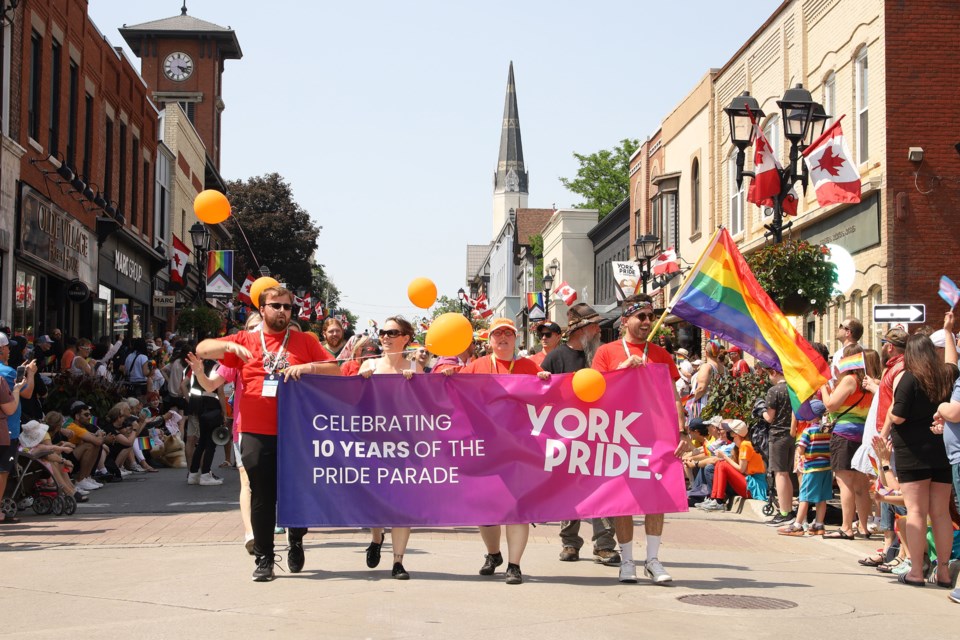York Pride director of operations Jacob Gal can personally attest to rising hate incidents against LGBTQ+ individuals over the past few years.
He was physically assaulted twice in 2019, while in a parking lot with a vehicle with Pride decals, and again when putting up Pride decals on Main Street.
Having security ready for the Pride parade itself is important, Gal said.
“This is what happens when you do frontline work,” he said. “You unfortunately become a target. It’s just an example of why this frontline work is really important.”
Pride groups across the province are calling for more action to address the increase in hate incidents. Several Pride associations held a news conference last week calling on the provincial government to work with them and come up with a plan for ongoing funding to address rising hate incidents against them.
Statistics Canada found last year that hate incidents across the country doubled over the average in the past decade.
Northern Pride groups reported taking significant measures due to rising hate, with North Bay Pride switching to a “march for equity” after threats and Timmins Pride using a security plan for the first time in a decade.
York Pride was not involved in the news conference, but Gal said the groups have a point. With more and more communities having Pride events in Ontario, even in places where they might get more pushback, he said having a government plan to help with safety could help.
“The government needs to act,” he said, noting the Statistics Canada tracking of hate crimes. “You’re not going to get people coming out to these events if they don’t feel comfortable.”
Confronting people about hate is not always easy, according to PFlag York Region president Tristan Coolman.
The leader of the local LGBTQ+ advocacy group recalled talking to a few co-workers in Toronto about them eating at Chick-fil-A, a restaurant chain whose owner has notoriously spoken against marriage equality and backed groups sharing similar views.
Speaking about this stoked a defensive reaction from his colleagues, Coolman said. But despite the discomfort, he said efforts like this are needed to address a rising amount of hate against LGBTQ+ happening in York Region and everywhere.
“You have to confront your own biases. You have to confront your own actions,” he said. “We have to do the work.”
But Coolman said he is unsure of how much more the government could do on the rising hate.
“What exactly are we expecting the government to do?” he said. “It’s us. It’s people and neighbours. It’s friends and people we know who are influenced. We need to get our boots on the ground as people who are progressive and who are a little more included to be more welcoming, and have tough conversations with people we’ve been avoiding.”
Still, the NDP has put forward a private member’s bill to establish community safety zones around venues hosting LGBTQ+ events and levy fines for harassment and hate speech.
Coolman complemented the security at York Pride and said he only saw a couple of individuals passing hateful cards near the parade route.
“Those individuals are always going to be around. We can’t assume that we can completely get rid of those individuals. We do live in a society of free thought,” he said. “But what we can do is make them uncomfortable. We can make them uncomfortable by having difficult conversations and calling out the misinformation.”
York Pride has robust security measures, Gal said, with private security, the York Region Amateur Radio Club and York Regional Police working in tandem to monitor everything. He cited that someone hateful at year's Pride parade was getting into people's faces too much and was quickly addressed by town bylaw officers before being arrested by police.
Hateful individuals are feeling emboldened by a variety of politicians in recent years, Gal said, and are often misinformed by information online.
“They don’t even know what they’re protesting about … they don’t even have a solid argument about how they really feel about the issue,” Gal said. “It creates this toxic culture which encourages people to come out and protest, which ultimately creates unstable environments for people coming out to connect.”
-With files from The Trillium
